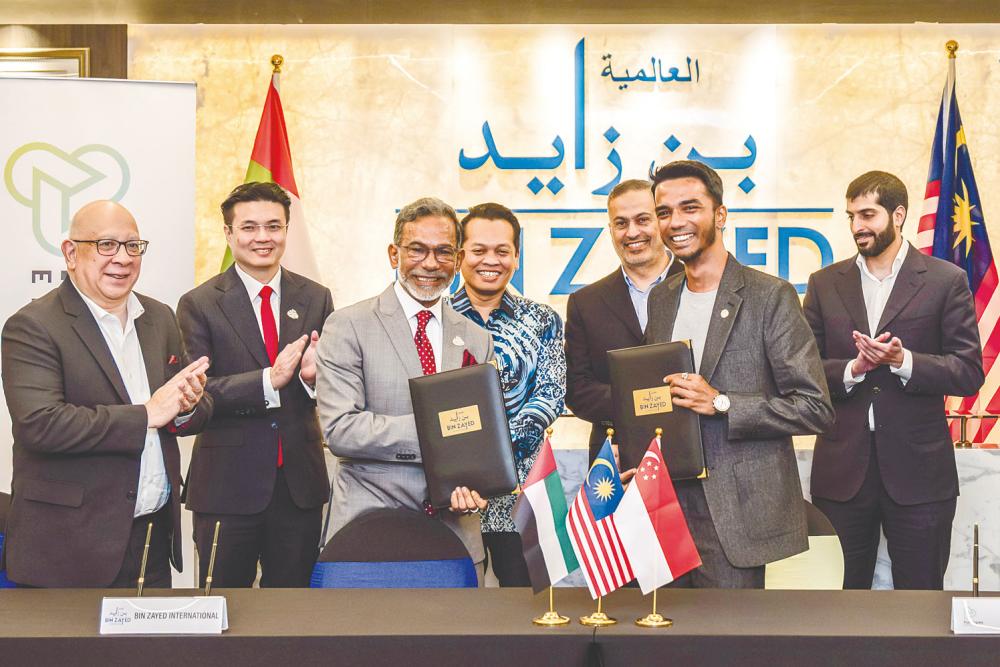KUALA LUMPUR: Malaysia stands to be the future global hub for clean aviation fuel as there is a growing global urgency for decarbonisation and Malaysia’s untapped potential.
Natural Resources and Environmental Sustainability Minister Nik Nazmi Nik Ahmad said with global aviation shifting towards green solutions, Malaysia is seizing the opportunity to lead by building on its strengths in logistics, infrastructure, and policy.
“I urge Malaysian entities to step up and explore synergistic collaborations that will strengthen Malaysia’s position in the global green energy landscape,” he said during the signing ceremony between Bin Zayed International (M) Bhd (BZI) and Malaysia-based FatHopes Energy (FHE) today.
BZI and FHE have affirmed their commitment to invest RM2.19 billion (US$500 million) to develop the world’s first integrated sustainable aviation fuel (SAF) refinery in Port Klang.
According to Nik Nazmi, the strategic partnership between BZI and FHE signals Malaysia’s emergence as a significant player in the global clean energy and low-carbon economy. “The development of a world-scale SAF refinery in Malaysia is of immense strategic importance. This investment will serve as a catalyst for far-reaching transformation across our energy and aviation sectors.”
Nik Nazmi said that by reducing reliance on imported SAF and unlocking Malaysia’s potential as a regional producer and exporter, the country is paving the way for a more self-reliant and competitive green economy.
This project addresses one of the most pressing challenges – decarbonising the aviation sector, he added.
“The development of the SAF refinery will contribute meaningfully to decarbonise the aviation sector, enabling the aviation company to meet their emissions reduction target, supporting energy transition and contributing towards Malaysia’s net-zero aspiration,” Nik Nazmi said.
BZI managing director and Bin Zayed (S) Pte Ltd executive director Datuk Seri Shamir Kumar Nandy said the partnership with FHE is more than a business venture.
“It is a statement of our long-term commitment to Malaysia and the region. We believe this project can anchor Malaysia’s leadership in the global SAF economy while supporting regional decarbonisation goals and ESG-aligned industrial growth,“ he said.
Although the percentage of equity BZI will hold in FHE is still being finalised, Shamir Kumar confirmed that the company will be underwriting the full RM2.19 billion cost of the refinery.
“We are fully committed to getting this refinery up and running – whatever it takes. With solid financial backing, we are moving forward confidently, driven by our belief in the project’s long-term sustainability and commercial potential,“ he said.
Construction is expected to begin within the next 12 months, pending regulatory approvals and environmental clearances. The project targets a final investment decision by mid-2026, with commercial operations set to begin by 2029.
According to FHE CEO Vinesh Sinha, the refinery, which is currently in the feasibility stage, could produce up to 300,000 tons of SAF annually. This will require an estimated 330,000 tonnes of feedstock, predominantly waste-based oils such as used cooking oil and other residual fats, sourced through FHE’s extensive network across Southeast Asia and India.
The refinery will adopt a multi-feedstock approach, supported by FHE’s proprietary digital traceability platform that ensures supply chain integrity and emissions transparency from collection to production.
“This is not just about building a plant. It is about creating an ecosystem that transforms waste into value, enables industrial decarbonisation, and propels Malaysia into the next era of clean aviation,” Vinesh said.
Malaysia’s domestic feedstock alone would not be sufficient to sustain the plant’s operations, he added, hence the importance of regional sourcing.
“Malaysia is a small country in terms of population, and we do not generate the required volume of waste oils locally. Our supply chain has grown over the last 15 years to cover most of Southeast Asia and parts of India,” he said.
Vinesh acknowledged the project will face technical and regulatory challenges, including major infrastructure upgrades at Port Klang and securing key inputs such as hydrogen and nitrogen.
“As the first facility of its kind in Malaysia and the region, we’re working closely with authorities to chart the way forward,” he said.
While the long-term vision is for SAF to be produced in Port Klang to serve Malaysia’s domestic aviation sector, he said the refinery is being designed with flexibility in mind to accommodate both local and export markets.
“We are hopeful that Malaysia will adopt stronger SAF mandates, which would allow all the fuel to be consumed locally. But initially, we will balance domestic supply with export demand, depending on policy frameworks and offtake agreements.”
While the long-term goal is to serve Malaysia’s domestic SAF demand, contingent on future government mandates, Vinesh said the facility will initially balance both local and export markets, adjusting as the regulatory environment evolves. “If the 47% mandate comes into play, we could see all of it used domestically.”









